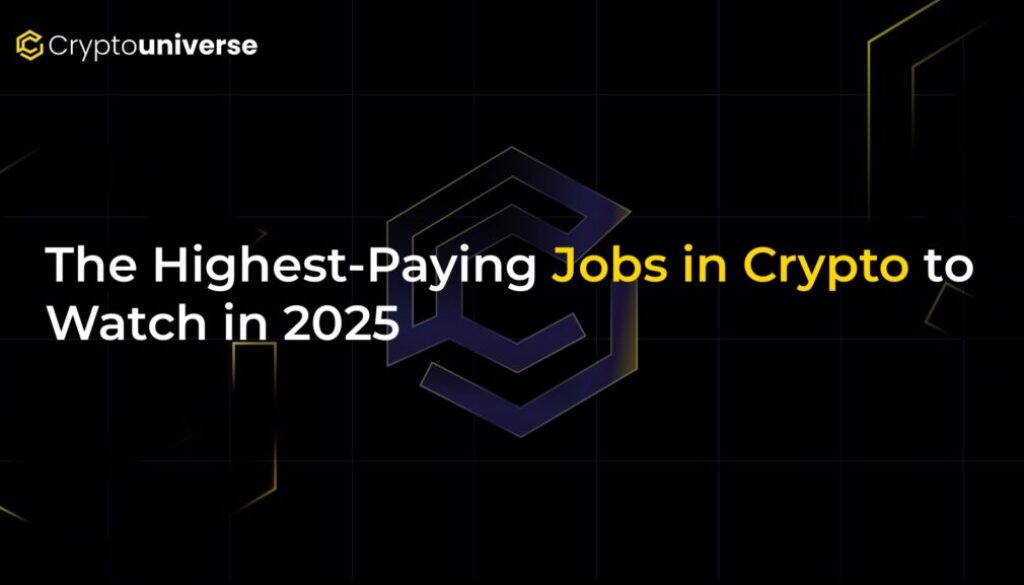The Highest-Paying Jobs in Crypto to Watch in 2025

The Digital Gold Rush: Uncovering the Most Lucrative Web3 Careers
As the blockchain space matures, the career landscape is evolving from a niche interest into a booming global industry. While many focus on trading digital assets, the real, sustainable wealth is often built by professionals in high-demand roles. According to the Web3 Industry Report 2025, the sector now employs over 460,000 people, with 100,000 new jobs added in the last year alone. This explosive growth has created a fierce competition for talent, driving salaries to staggering heights.
But which roles command the highest paychecks? The best-paying blockchain jobs are typically those that directly generate revenue, manage immense financial risk, or navigate the complex regulatory maze. These positions demand a unique blend of technical skill, financial acumen, and strategic thinking. In Web3, total compensation (TC) is often a cocktail of base salary, performance bonuses, and equity or tokens, meaning your earnings can fluctuate with the market itself.
Here’s a breakdown of the highest-paying jobs in crypto to watch in 2025, what it takes to land them, and the potential rewards and risks involved.
1. Quantitative Analyst (Quant)
Potential Earnings: $180,000 – $325,000+
A quant’s total compensation is directly tied to their trading performance, with top earners at major funds and market makers seeing their pay scale significantly with their profit and loss (PnL) share. While public job postings often list base salaries around $150,000-$200,000, data from top-tier firms shows that total packages, including bonuses, frequently reach the $270,000-$425,000 range.
What They Do
Crypto quants are the masterminds behind high-frequency trading strategies. They build complex mathematical models to identify and exploit market inefficiencies, executing automated trades across multiple exchanges 24/7. Their work involves deep analysis of market microstructure, on-chain data, and exchange APIs to create profitable, slippage-aware algorithms.
How to Break In
This is not an entry-level role. Aspiring quants need a strong foundation in computer science and finance. You’ll need to be an expert in languages like Python, C++, or Rust. To stand out, build a portfolio by publishing detailed research notebooks on signal discovery, contributing to open-source market data projects, and demonstrating your ability to backtest strategies robustly.
The Fine Print
Your income is directly linked to market volatility. When spreads are wide and the market is moving, bonuses can be astronomical. In quiet, sideways markets, your earnings can compress significantly, leaving you with just your base salary. It’s a high-pressure role in a market that never sleeps.
2. Legal Counsel & Chief Compliance Officer (CCO)
Potential Earnings: Up to $500,000+
Navigating the legal gray areas of crypto is a top priority for any major company. As a bellwether, senior legal compensation at a company like Coinbase can range from $385,000 to $522,000. Chief compliance officers in the fintech space can expect cash compensation over $200,000, with equity and bonuses pushing the total package much higher.
What They Do
These are the guardians of the company, ensuring it operates within the ever-changing global regulatory frameworks. Their responsibilities span everything from securing licenses (like the New York BitLicense) and designing Anti-Money Laundering (AML) programs to negotiating with regulators and advising on product launches. They are the essential barrier between a company’s ambitions and its legal risks.
How to Break In
The most common path is starting in the fintech or regulatory practice of a major law firm (BigLaw) and then moving in-house to an exchange or Layer-2 protocol. Expertise in cross-border licensing, securities law, and payments is critical. The ability to say “no” to a product team without derailing a launch is a prized soft skill.
The Fine Print
A significant portion of the compensation is often equity-heavy, meaning its value is tied to the company’s token price and vesting schedules. Hiring for these roles is cyclical and often driven by major litigation or new regulatory crackdowns rather than just bull markets.
3. Content Creator & Influencer
Potential Earnings: Six to Seven Figures Annually
For top-tier creators, income is driven by sponsorships, and the numbers can be massive. This is one of the highest-paying jobs in crypto, but also one of the riskiest.
For example, a podcast like “Bankless” with 2 million monthly downloads could generate substantial revenue. At a blended cost-per-thousand (CPM) of $30 for two ad slots, the monthly podcast revenue alone could be around $120,000 (2,000,000 / 1,000 * $30 * 2). This doesn’t include YouTube, newsletter, and event sponsorships.
What They Do
Crypto creators build and monetize loyal audiences through channels like YouTube, podcasts, newsletters, and social media. They produce educational content, news analysis, and market commentary, earning revenue by partnering with brands who want to reach their dedicated follower base.
How to Break In
Consistency is key. Pick a niche you are passionate and knowledgeable about, choose one primary platform (like YouTube or a newsletter), and publish high-quality content regularly. Once you build steady engagement, create a professional media kit and rate card to approach sponsors. Focus on building trust first; monetization will follow.
The Fine Print
This path is a grind with no guaranteed income. You are your own brand, and your reputation is everything. Regulators like the FTC in the US require clear and conspicuous disclosure of all sponsored content. Failing to do so can result in legal trouble and a loss of audience trust.
4. Smart Contract Auditor
Potential Earnings: $150,000 Base + Million-Dollar Bounties
While a senior security engineer at an audit firm can expect a base salary of $150,000-$200,000+, the real money is in bug bounties. Leading platforms like Immunefi list critical bug payouts up to $5 million, with the all-time record being a staggering $10 million paid out for finding a vulnerability in Wormhole.
What They Do
Auditors are the elite cybersecurity experts of Web3. They meticulously review smart contract code to find vulnerabilities before malicious hackers can exploit them, safeguarding protocols with billions of dollars in total value locked (TVL). They are the last line of defense against catastrophic financial loss.
How to Break In
Build a public track record. Participate in capture-the-flag (CTF) competitions, hunt for bugs on platforms like Immunefi, and publish detailed post-mortems of your findings. Joining a reputable audit firm is a great way to gain experience before going freelance or focusing on bounties.
The Fine Print
Bug bounty income is unpredictable. You could go months without a significant find and then earn more than a year’s salary from a single critical discovery. Payouts may also be in project tokens with vesting periods, adding price volatility to your reward.
5. Bitcoin Mining Infrastructure Broker
Potential Earnings: 1-3% Commission on Multi-Million Dollar Deals
This is a high-stakes sales role where a single deal can redefine your year. Brokers typically earn a 1-3% success fee on the total contract value. On a $12 million deal to place a mining farm, a 1% commission is $120,000. It’s not uncommon for experienced brokers to have six-figure months.
One broker for Munich International Mining estimated their commissions for September 2025 exceeded $140,000 from just one standard 50 MW site deal in Texas.
What They Do
Brokers are the matchmakers of the Bitcoin mining world. They connect large-scale miners and investors with facilities that have the necessary infrastructure—namely, access to cheap and abundant power. They operate in global hotspots like Texas, Paraguay, Ethiopia, and the Gulf, negotiating complex deals for hosting capacity and entire mining sites.
How to Break In
Start small by brokering smaller hosting deals to build a network of verified buyers and sellers. You need an encyclopedic knowledge of the industry, from power usage effectiveness (PUE) and curtailment economics to the specs of the latest mining hardware. Trust and technical expertise are your currency.
The Fine Print
This is an almost purely commission-based role. If you don’t close deals, you don’t earn. Success hinges on a constant pipeline of qualified leads, and even seasoned brokers can face long dry spells between big paydays.
Final Thoughts on Your Web3 Career Path
The path to a top-paying job in crypto is demanding, but the rewards can be life-changing. Whether you’re a developer, lawyer, or salesperson, the key is to specialize in skills that are directly tied to a project’s revenue or security. Most of these roles are global and can be done remotely, offering incredible flexibility.
As you explore these opportunities, exercise caution. Use credible sources like Levels.fyi for salary data and be wary of any offer that seems too good to be true. The highest-paying jobs in crypto are challenging and volatile, but for those with the right skills and risk appetite, they represent the forefront of a financial and technological revolution.


